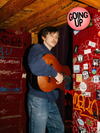Thousands of Guinean Migrants Came to New York City. This Weekend, Two of Guinea's Biggest Pop Stars Came to Them
"If he sees me out partying, he'll tell my mom back in Conakry that I'm a bandit!" said one concertgoer of another, his uncle.

This story first ran in Hell Gate, a worker-owned, subscriber-funded news outlet about New York City. As a fellow cooperative publication, we are excited to share this feature about Guinean superstars Habib Fatako and Maxim BK and the fans who love them. Hell Gate is a great read even if you don't live in the city—check them out and consider subscribing if you love their work like we do!
Red, green, and yellow lasers cut through the smoke floating in the air at the Queens concert hall Amazura on Friday night, projecting an endless Guinean flag above the sold-out dance floor. Elhadj Mohammed Diallo, the former journalist who served as the evening's host, paced across the stage, working the crowd for a cool four hours before the main event: Guinean rapper Maxim BK, followed by national treasure Habib Fatako, who blends traditional pastoral music known as mamaya with contemporary influences.
Among the 5,000 people on their feet, I saw a young man reach his hands through the crowd to embrace his childhood friend, whom he hadn't seen since leaving his village in Guinea. Neither knew that the other had also come to the United States. A separate set of friends who had made the journey to the Americas together reunited. "We got separated in Honduras," one told me. Yet another young man crouched behind me to hide from his uncle, who lives in New Jersey, and who was at the other end of the dance floor. "If he sees me out partying, he'll tell my mom back in Conakry that I'm a bandit!" he said. Many people told me this was their first time ever going out in New York City after almost two years of living here.




